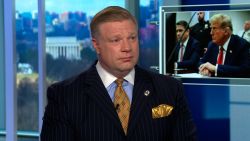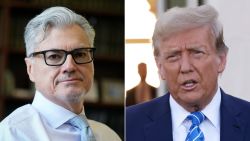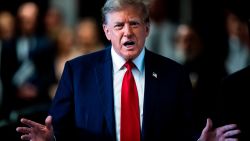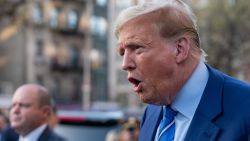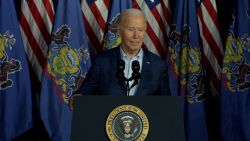Part of America is tiptoeing toward an uncomfortable self-examination about race. But President Donald Trump, bunkered down in his fortress behind high fences now ringing the White House, is spurning a building wave of national reflection.
The death of George Floyd in the latest example of police brutality has drawn tens of thousands of people onto the streets and caused some Americans to launch a fresh appraisal of the systemic racism and bias black Americans experience in this country.
Sensing a moment of national reckoning, some major corporations, company managers, major sports leagues and white politicians have felt compelled to speak out. Anecdotal signs of a shift can be seen in Amazon bestseller lists dominated by books about racial prejudice. A story about a heart-to-heart about race between an airline executive and a flight attendant from a rival carrier was a feel-good moment in a wrenching week.
NFL quarterback Drew Brees on Thursday repudiated his own criticism of players who take a knee during the national anthem. “I recognize that I should do less talking and more listening … and when the black community is talking about their pain, we all need to listen,” Brees said.
There is a notable absentee from this broadening debate: Trump. While he has condemned Floyd’s death and promised justice several times, the President, who has a history of flinging racist rhetoric, is not examining his own prejudices.
Instead, Trump has amplified accusations that former President Barack Obama inflamed racial angst, boasted that he’s done more for African Americans than any President but Abraham Lincoln, had federal forces charge peaceful protesters so he could have a divisive photo-op and threatened to send troops into the states.
Trump defended heavy handed action by federal security forces in Washington, DC, on Thursday, doubling down on the tough guy persona that he hopes will reverse his current polling deficit to Democrat Joe Biden in the presidential election race.
“The problem is not the very talented low-flying helicopter pilots wanting to save our city, the problem is the arsonists, looters, criminals, and anarchists, wanting to destroy it (and our Country)!” Trump tweeted.
And then, later on Thursday, Trump shared a letter on Twitter that referred to the peaceful protesters who were forcibly dispersed from a park near the White House as “terrorists.”
The President no doubt believes he is on solid ground in reflecting the sentiments of his base supporters with his hard line. Conservative media is already creating a narrative that reflections on race are liberal virtue signaling and political correctness run wild and that protests represent lawlessness by radicals and are not genuine political uprisings.
There has been violence and looting alongside some protests but most demonstrations are now largely peaceful. Arguing, however, that events of the last week are purely a law-and-order question implies there isn’t institutional discrimination and police brutality to be addressed. National security adviser Robert O’Brien told CNN on Sunday for instance that he thought there was no “systemic racism” in police ranks and that there were just “some bad apples in there.”
Even Attorney General William Barr, who is defending his hardline stand on protests in Washington, DC, said Thursday that while most police officers do their jobs “bravely and righteously” it is also “undeniable that many African Americans lack confidence in our American criminal justice system.”
“This must change,” Barr said.
Trump largely dodged such questions during a Fox News Radio interview this week, admitting that there was a “long term problem” and everybody has “to do better.” But he used the chance to blame the issue on Biden and boast about his own standing among African Americans.
That the President would not want to be part of a growing national appraisal of America’s racial wounds and the injustices black Americans face now, or feel a responsibility to lead it in a moment of deep crisis, is a reflection on his character – and the manner in which he has conducted his administration and campaigns, which have tended to open historic wounds.
The power of the moment – even as the country is battling a pandemic and consequent economic devastation – leaves open the possibility that Trump has misjudged the public mood.
‘A lot of motion but very little action’
There have been many failed “conversations about race” in US politics. Successive racially motivated outrages have produced little meaningful legal or political change. Black families still have less wealth than white families, black Americans still aren’t well represented at the upper-levels of management and are more likely to die from coronavirus and to have poor health care. Not to mention, the previous protests against police brutality haven’t stopped the killing of black men and women in this country.
“Oftentimes there’s a lot of motion but very little action” from firms amid calls for reform, John Harmon, a member of the US Chamber of Commerce committee tasked with correcting the inequality of opportunity, told CNN’s Cristina Alesci.
So there is plenty of reason for skepticism that when fury, sadness and guilt eases over Floyd’s death, nothing will end up being that much different this time.
Yet that would also be a cynical view that does not take into account the humanity of the reaction to Floyd’s death, which came at a moment when emotions were already fragile following weeks of coronavirus lockdowns and the loss of more than 100,000 Americans. There at least appears to be some hope that more white Americans than ever before are taking the time to examine the cultural biases that they did not believe they bore.
Similarly there appears to be a willingness to more carefully listen to the agonies of black Americans. While there have been clashes between demonstrators and police – and some criminal elements taking advantage of the protests – there have been inspiring scenes as well. Some police officers, for instance, took a knee in solidarity with the goals of the peaceful protests.
Obama, in his most expansive comments on events of the last few weeks, said Wednesday that prospects were far more hopeful for change than in the darkest days of the 1960s.
“You look at those protests and that was a far more representative cross section of America out on the streets, peacefully protesting. Who felt moved to do something because of the injustices that they have seen. That didn’t exist back in the 1960s,” the former President said.
‘I have been challenged’
While many Republican senators have dodged questions about Trump’s behavior, Alaska GOP Sen. Lisa Murkowski had a personal moment of introspection on Capitol Hill on Thursday.
“I have been challenged by some. I have been chastised by some … from some very close friends who say ‘you are silent, Lisa. Why haven’t you fixed what we are seeing?’ I have struggled with the right words,” she said, during a debate on an anti-lynching bill during which Democratic Sens. Cory Booker and Kamala Harris spoke out against GOP Sen. Rand Paul’s attempt to narrow the scope of the legislation.
“As a white woman born and raised in Alaska with a family that was privileged, I cannot feel that openness and rawness that I just heard expressed by my friends Cory and Kamala. I have not lived their life. I can listen, and I can educate myself, and I can try to be healer when we need to be healed.”
Trump is more likely to empathize with reactionary feelings stirred by the epic events of the last few days. (He promised on Thursday to campaign against Murkowski, who earlier in the day applauded former Defense Secretary James Mattis’ rebuke of the President, when she’s up for reelection in 2022.)
And it’s possible that he could be making a solid political bet. His victory in 2016 was partly a reaction to the first black presidency of Obama and the tide of social change and diversity that it helped stir. Were NFL players suiting up on Sunday, it’s likely that many more would be following the example of Colin Kaepernick, whom Trump helped force out of the league with racially charged rhetoric, and taking a knee.
The President seems tempted to further exploit the drama to create a wedge issue in November’s election.
His supporters in conservative media are already cranking up the heat. Fox News host Laura Ingraham on Wednesday defended Brees, who is white, for his comments on respecting the US anthem and flag. She had previously lashed out at basketball star LeBron James, who is black, after he criticized Trump and told him to “shut up and dribble.”
Despite such divisive rhetoric, civil rights icon and Democratic Rep. John Lewis of Georgia had an ultimately optimistic interpretation of America’s latest confrontation with its racial inequalities. He said on a House Democratic conference call Thursday that while he may have “thought we were further… down the road to redeem the soul of America… we will get there.”
And echoing Obama, he said that throughout his years in the civil rights movement, he had never before seen people from such diverse backgrounds coming together.
Lauren Fox and Clare Foran contributed to this story.



